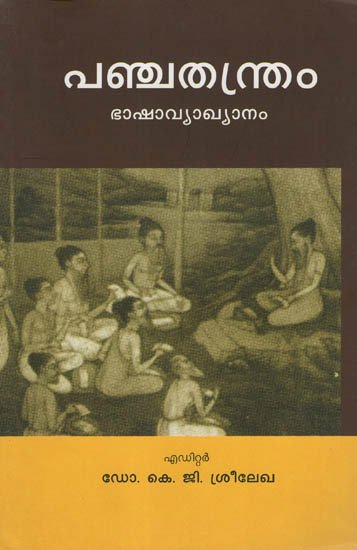Panchatantra [sanskrit]
by Dr. Naveen Kumar Jha | 2016 | 13,828 words | ISBN-13: 9788193077962
The Sanskrit edition of the Panchatantra referencing the English translation and grammatical analysis. Written by Vishnu Sharma and possibly dating as early as 1200 BCE, the Panchatantra (or Pancatantra) represents a collection of short stories teaching basic ethical values and moral conduct that was commonly practiced in ancient Indian. Alternative titles: Śrīviṣṇuśarman Pañcatantra (श्रीविष्णुशर्मन् पञ्चतन्त्र, Śrī-viṣṇuśarman pancatantra, श्री-विष्णुशर्मन्, Sri-visnusarman)
Verse 3.42
यद् अपसरति मेषः कारणं तत् प्रहर्तुं मृग-पतिर् अपि कोपात् सङ्कुचत्य् उत्पतिष्णुः ।
हृदय-निहित-भावा गूढ-मन्त्र-प्रचाराः किम् अपि विगणयन्तो बुद्धिमन्तः सहन्ते ॥ ४२ ॥
yad apasarati meṣaḥ kāraṇaṃ tat prahartuṃ mṛga-patir api kopāt saṅkucaty utpatiṣṇuḥ |
hṛdaya-nihita-bhāvā gūḍha-mantra-pracārāḥ kim api vigaṇayanto buddhimantaḥ sahante || 42 ||
The English translation of Panchatantra Verse 3.42 is contained in the book The Complete Pancatantra: Sanskrit Text with English Translation by Dr. Naveen Kumar Jha. This book is not available online so in order to read the full text and translation you should buy the book:
Buy now! English translation by Dr. Naveen Kumar Jha (2016)
Glossary of Sanskrit terms
Note: This extracts Sanskrit terms and links to English definitions from the glossary, based on an experimental segmentation of verse (3.42). Some terms could be superfluous while some might not be mentioned. Click on the word to show English definitions.
Yat, Yad, Apa, Sarat, Mesha, Karana, Tat, Tad, Praha, Ritu, Mriga, Pati, Api, Kopa, Utpatishnu, Hridaya, Nihita, Bhava, Gudha, Mantra, Pracara, Kim, Vigana, Yantri, Buddhimat,
Analysis of Sanskrit grammar
Note: this is an experimental feature and only shows the first possible analysis of the Sanskrit text (Panchatantra Verse 3.42). If the system was successful in segmenting the sentence, you will see of which words it is made up of, generally consisting of Nouns, Pronouns, Verbs, Participles and Indeclinables. Click on the link to show all possible derivations of the word.
- Line 1: “yad apasarati meṣaḥ kāraṇaṃ tat prahartuṃ mṛga-patir api kopāt saṅkucaty utpatiṣṇuḥ ”
- yad -
-
yat (indeclinable relative)[indeclinable relative]yat (noun, masculine)[compound]yad (noun, masculine)[compound], [adverb], [nominative single], [vocative single]yat (noun, neuter)[nominative single], [vocative single], [accusative single]√i -> yat (participle, neuter)[nominative single from √i class 2 verb], [vocative single from √i class 2 verb], [accusative single from √i class 2 verb]yat (pronoun, neuter)[nominative single], [accusative single]
- apa -
-
apa (indeclinable)[indeclinable]apa (Preverb)[Preverb]
- sarati -
-
sarat (noun, masculine)[locative single]sarat (noun, neuter)[locative single]√sṛ -> sarat (participle, masculine)[locative single from √sṛ class 1 verb]√sṛ -> sarat (participle, neuter)[locative single from √sṛ class 1 verb]√sṛ (verb class 1)[present active third single]
- meṣaḥ -
-
meṣa (noun, masculine)[nominative single]
- kāraṇam -
-
kāraṇa (noun, neuter)[adverb], [nominative single], [accusative single]kāraṇā (noun, feminine)[adverb]
- tat -
-
tat (indeclinable correlative)[indeclinable correlative]tad (noun, neuter)[compound], [nominative single], [accusative single]
- prahar -
-
prahā (noun, feminine)[nominative single]
- ṛtum -
-
ṛtu (noun, masculine)[accusative single]
- mṛga -
-
mṛga (noun, masculine)[compound], [vocative single]
- patir -
-
pati (noun, feminine)[nominative single]pati (noun, masculine)[nominative single]
- api -
-
api (indeclinable preposition)[indeclinable preposition]ap (noun, neuter)[locative single]
- kopāt -
-
kopa (noun, masculine)[adverb], [ablative single]
- Cannot analyse saṅkucaty*ut
- utpatiṣṇuḥ -
-
utpatiṣṇu (noun, masculine)[nominative single]utpatiṣṇu (noun, feminine)[nominative single]
- Line 2: “hṛdaya-nihita-bhāvā gūḍha-mantra-pracārāḥ kim api vigaṇayanto buddhimantaḥ sahante ”
- hṛdaya -
-
hṛdaya (noun, masculine)[compound], [vocative single]hṛdaya (noun, neuter)[compound], [vocative single]
- nihita -
-
nihita (noun, masculine)[compound], [vocative single]nihita (noun, neuter)[compound], [vocative single]
- bhāvā* -
-
bhāva (noun, masculine)[nominative plural], [vocative plural]
- gūḍha -
-
gūḍha (noun, masculine)[compound], [vocative single]gūḍha (noun, neuter)[compound], [vocative single]√guh -> gūḍha (participle, masculine)[vocative single from √guh class 1 verb]√guh -> gūḍha (participle, neuter)[vocative single from √guh class 1 verb]
- mantra -
-
mantra (noun, masculine)[compound], [vocative single]
- pracārāḥ -
-
pracāra (noun, masculine)[nominative plural], [vocative plural]
- kim -
-
kim (indeclinable interrogative)[indeclinable interrogative]kim (indeclinable)[indeclinable]kim (pronoun, neuter)[nominative single], [accusative single]
- api -
-
api (indeclinable preposition)[indeclinable preposition]ap (noun, neuter)[locative single]
- vigaṇa -
-
vigaṇa (noun, masculine)[compound], [vocative single]vigaṇa (noun, neuter)[compound], [vocative single]
- yanto* -
-
yat (noun, masculine)[nominative plural], [vocative plural]yantṛ (noun, masculine)[vocative single]√i -> yat (participle, masculine)[nominative plural from √i class 2 verb], [vocative plural from √i class 2 verb]
- buddhimantaḥ -
-
buddhimat (noun, masculine)[nominative plural], [vocative plural]
- sahante -
-
√sah (verb class 1)[present middle third plural]
Other editions:
Also see the following editions of the Sanskrit text or (alternative) English translations of the Panchatantra Verse 3.42
Pancatantra of Visnusarman
by M. R. Kale (2015)
Panchatantra in Simple Sanskrit
by Dr. Vishwas (2016)
Panchatantram (Telugu)
by Tadanki Venkata Lakshmi Narasimha Rao (2020)
Published by J. P. Publications, Vijayawada; Throughout black & white Illustrations; 9788192053851.
Buy now!Preview of verse 3.42 in Telugu sript:
యద్ అపసరతి మేషః కారణం తత్ ప్రహర్తుం మృగ-పతిర్ అపి కోపాత్ సఙ్కుచత్య్ ఉత్పతిష్ణుః ।
హృదయ-నిహిత-భావా గూఢ-మన్త్ర-ప్రచారాః కిమ్ అపి విగణయన్తో బుద్ధిమన్తః సహన్తే ॥ ౪౨ ॥
Panchatantram Bhashavyakhyanam (Malayalam)
by Dr. K.G. Sreelekha (2010)
Published by the University of Kerala.
Buy now!Preview of verse 3.42 in Malayalam sript:
യദ് അപസരതി മേഷഃ കാരണം തത് പ്രഹര്തും മൃഗ-പതിര് അപി കോപാത് സങ്കുചത്യ് ഉത്പതിഷ്ണുഃ ।
ഹൃദയ-നിഹിത-ഭാവാ ഗൂഢ-മന്ത്ര-പ്രചാരാഃ കിമ് അപി വിഗണയന്തോ ബുദ്ധിമന്തഃ സഹന്തേ ॥ ൪൨ ॥
The Panchatantra Stories (Tamil)
by P. S. Aacharya (2017)
Published by Narmadha Pathippagam, Chennai.
Buy now!
Panchatantrer Galpa (Bengali)
by Children's Book Trust (2014)
Throughout color Illustration; 9788170112730
Buy now!Preview of verse 3.42 in Bengali sript:
যদ্ অপসরতি মেষঃ কারণং তত্ প্রহর্তুং মৃগ-পতির্ অপি কোপাত্ সঙ্কুচত্য্ উত্পতিষ্ণুঃ ।
হৃদয-নিহিত-ভাবা গূঢ-মন্ত্র-প্রচারাঃ কিম্ অপি বিগণযন্তো বুদ্ধিমন্তঃ সহন্তে ॥ ৪২ ॥
Panchatantra in Gujarati (Comic)
by Anant Pai (2013)
[શિયાળા અને રણશિંગ પંચતંત્ર] Published by Amar Chitra Katha; Throughout Color Illustrations; 9789350853115
Buy now!Preview of verse 3.42 in Gujarati sript:
યદ્ અપસરતિ મેષઃ કારણં તત્ પ્રહર્તું મૃગ-પતિર્ અપિ કોપાત્ સઙ્કુચત્ય્ ઉત્પતિષ્ણુઃ ।
હૃદય-નિહિત-ભાવા ગૂઢ-મન્ત્ર-પ્રચારાઃ કિમ્ અપિ વિગણયન્તો બુદ્ધિમન્તઃ સહન્તે ॥ ૪૨ ॥
![Panchatantra [sanskrit] - book cover](/uploads/a/Pancatantra.jpg)






